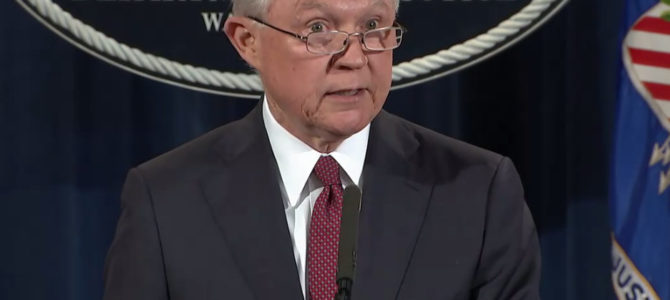
This week, for the first time, Americans were able to read the Inauguration Day letter Barack Obama left for Donald Trump, imploring the new president to defend “democratic institutions and traditions — like rule of law, separation of powers, equal protection and civil liberties.” Presidents have a duty to set aside partisanship, Obama wrote, because “it’s up to us to leave those instruments of our democracy at least as strong as we found them.”
Oh, c’mon. There is no worse person in the world to lecture presidents on the importance of separation of powers. None. If there’s one thing that exemplified Obama’s administration, it was its embrace of executive unilateralism. No administration in memory was stopped more often by courts on this front—often by unanimous Supreme Court decisions.
One of the most blatant circumventions of “democratic norms”—those things that so many people on cable news channels keep lecturing us about—was the Deferred Action for Childhood Arrivals (DACA). Today, in a press conference, Attorney General Jeff Sessions rescinded those actions and offered a six month delay in enforcement so that Congress could pass a bill in the appropriate way.
There are a vast number of solid economic and moral arguments for legalizing the children of illegal immigrants. In substance, I agree with DACA. Yet, the justification given by the president and his allies at the time was summed up best by The Washington Post’s Eugene Robinson, who then argued that the “only reason President Obama has to act on immigration reform is that House Speaker John Boehner won’t.”
For one thing, this an admission that DACA was abnormal. The Constitution makes no allowance for the president to write law “if Congress doesn’t act.” Moreover, it offers a bigger question: Is Robinson’s rationalization in play for all presidents? If Congress doesn’t build a border wall or enact tax reform (or act on any of the policies the President views as imperative), is Trump free to circumvent Congress because of DC inertia? Those arguing that DACA should stay in this iteration are arguing that Trump should be empowered to do the same. We can’t have a stable government if there are separate sets of rules for Democrats and Republicans.
The reaction to DACA exposes much of the disingenuousness of the post-election “norms” crowd. How could those who took part in the national hissy fit over the “unconstitutional” short-term executive restriction on immigration from terrorist-ridden nations now act as if DACA is a proper way to govern? I mean, New York Governor Andrew Cuomo has threated to sue the president for rolling back the executive actions of another president, which were enacted ostensibly on the idea of prosecutorial discretion. Sue over what—following the law as written?
By the way, DACA has already been through courts, and as with most of Obama’s assault on process, it fared rather poorly. Now that Texas Attorney General Ken Paxton and others are threatening to sue, and the Supreme Court is back to nine justices, DACA would almost certainly lose there, as well. As it should.
Predictably, most of the stories covering this debate conflate the immigration process with the debate over executive actions. They offer a glut of sad stories about young immigrants whose parents came here illegally, and almost nothing on the legality of how the policy was implemented. Polls will tell us that most Americans want to legalize Dreamers. That is an important question for Congress and voters. I agree with them. Pass a law. But another important question might be: “Should the President make laws without Congress?” I suspect the breakdowns would constantly shift depending on who is president and who is answering. So, who knows, maybe malleable ideals and cynical partisanship are the only thing saving constitutional process.
Is Trump rescinding DACA due to some deep deference to the norms of process and the Constitution? Almost certainly, not. But it doesn’t matter. Just as it didn’t matter whether Obama was a swell guy when he created a law out of whole cloth. Say what you will about Trump, and there’s plenty to say, but nothing he’s done during his term thus far has undermined separation of powers in the way Obama regularly did. If anything, many of Trump’s executive orders have merely rolled back the abuses of the past eight years.
Like most things in DC these days, the DACA fight is probably just political theater, anyway. Trump is, no doubt, eager to take some pressure off himself. But the idea that the administration is going to start deporting Dreamers en masse in six months seems far-fetched. White House Press Secretary Sarah Huckabee admitted as much in her press conference on Tuesday. If Congress believes that’s the case, however, they should pass legislation to fix it. But can they? Congressional Republicans, who have been handing to the executive branch for years, have little appetite for the issue. “Amnesty” is still anathema to many conservatives. You can already picture the primary ads that would run if the only accomplishment Republicans had to show in 2018 was a bipartisan “amnesty” bill. Democrats, on the other hand, will act as if they’ve been winning election rather than losing them, and refuse to compromise on anything that adds additional enforcement measures or extra border funding. Martyring young immigrants for political gain is too precious a cudgel to give up.









